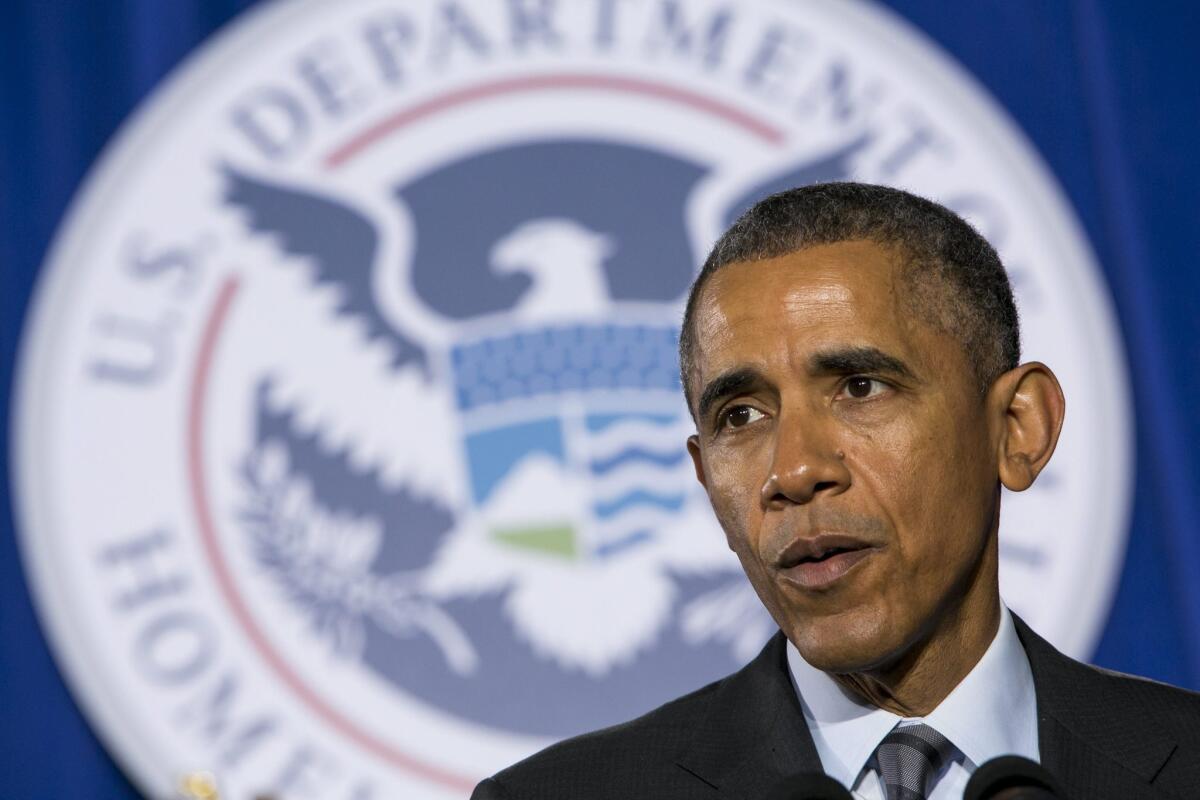Obama’s wish-list budget doesn’t make things easy for the GOP

- Share via
When one party owns the White House and the other holds Congress, the president’s annual budget is a strange, almost fictional document. It’s not a draft from which the real federal budget will be written; Congress controls that process from beginning to end. Instead, it’s merely the president’s announcement of what he’d do if Congress weren’t there. It’s a party platform with numbers.
So it wasn’t a surprise this week when President Obama’s budget for 2016 was pronounced dead on arrival even before it arrived. This year’s budget, like this year’s Obama, is progressive in content and populist in tone. It’s full of tax increases on the wealthy, which the Republican Congress won’t pass, and praiseworthy (but costly) domestic programs, which Congress won’t approve. White House aides were refreshingly candid about their low expectations. They acknowledged that most of their wish list was just that: a wish list.
Republican leaders grabbed the chance to dismiss Obama as not only wrong but, in a far more wounding charge, irrelevant. “The president gave the American people a good laugh yesterday,” House Speaker John A. Boehner (R-Ohio) said.
And yet, despite all that, Obama’s wish list was important for at least three reasons.
First, along with his Jan. 20 State of the Union speech, the budget gave the president a three-week-long excuse to campaign for things middle-class (especially female) voters may want, but Congress won’t give them: free community college, paid sick leave and parental leave, expanded child care and pre-kindergarten programs.
As he unveiled the budget on Monday, Obama denounced Republicans for having imposed “mindless austerity” on the country and implicitly blamed them for increasing inequality.
Meanwhile, the new GOP majority has had a slow start when it comes to presenting its agenda, especially in the House of Representatives, where conservatives have demanded tough votes on immigration and abortion that aren’t likely to appeal to most female voters.
Next, the budget confirmed that the era of seeking a “grand bargain,” a big bipartisan fiscal deal, is over.
Until last year, Obama met intermittently with Republicans to talk about a possible trade: cuts in future Medicare and Social Security spending (which Republicans want) in exchange for tax increases on the wealthy to fund domestic programs (which Democrats want).
Obama offered to change the formula for Social Security cost-of-living increases, a concession many Democrats denounced. But Republicans never settled on a tax increase they could deliver in return, and as the federal deficit shrank, the pressure for a deal receded and the idea withered.
In last year’s budget, the Social Security change silently disappeared, but White House aides said the offer was still available. This year, it wasn’t mentioned.
Finally, instead of heady grand bargains, this year’s budget offers some possibilities for small-ball bipartisanship.
It includes at least three administration goals that Republicans appear to want, too: a significant increase in defense spending, which Obama (but not the GOP) would match with increased domestic spending; a boost in spending on roads, bridges and other infrastructure; and a broad reform of corporate taxes.
Obama’s pitch: If Republicans can agree on a relatively modest increase in federal revenue — for example, by requiring U.S. corporations to pay a new tax on profits they hold overseas — that would pay for the increase both parties want in infrastructure.
“Everybody agrees that we have to fix our infrastructure,” said Jeffrey Zients, chairman of Obama’s National Economic Council (and a former consultant at Bain & Co., Mitt Romney’s old firm). “Everybody agrees that the current [corporate] tax system doesn’t work…. So we’re hopeful.”
Whether any such deals are possible is largely up to Sen. Mitch McConnell (R-Ky.), the new Senate majority leader. Business organizations are already denouncing Obama’s corporate tax proposal as too onerous. Sometime this spring, the House will send a thoroughly conservative budget proposal to the Senate, followed — with luck — by spending bills before the government runs out of money on Oct. 1.
McConnell says he wants to demonstrate that Republicans are capable of governing without the fiscal cliffs, government shutdowns and hostage dramas that Congress endured over the last four years.
But he needs to worry not only about Obama’s threats to veto bills he doesn’t like, which raises the threshold for passage to two-thirds, but also about the 24 GOP Senate seats that will be up for reelection in 2016, seven of them in states Obama won in 2012.
That’s why Obama is promoting a budget full of proposals that won’t come true. He knows he isn’t going to get most of what he wants, but he has no reason to make it easy for McConnell and his Republicans to get what they want, either. If the president and the majority leader can strike some small-ball deals, fine. If not, Congress won’t produce the impressive results that McConnell wants to take to the country in 2016 — which may have been Obama’s point all along.
Twitter: @DoyleMcManus
Follow the Opinion section on Twitter @latimesopinion and Facebook
More to Read
Sign up for Essential California
The most important California stories and recommendations in your inbox every morning.
You may occasionally receive promotional content from the Los Angeles Times.













